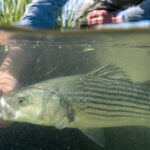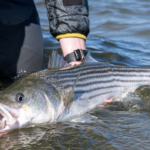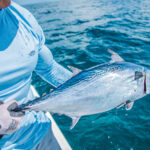
What to Watch for: ASMFC Spring Meeting
The Atlantic States Marine Fisheries Commission (ASFMC) will gather in Arlington, Virginia this week for the
Bluefin tuna are one of the most highly prized fish on Earth. Commercial and recreational anglers pursue them across the globe. There is an eastern and a western stock under the management of the International Commission for the Conservation of Atlantic Tunas. Our stock, the western, is severely depleted.
ICCAT has not done enough to sustain bluefin populations. In 2017, ICCAT abandoned a 20-year recovery plan and raised the quota. This move changed the course for bluefin. Now, they are no longer recovering, but declining.
In response to the depleted status, the United States initiated Gear Restricted Areas in 2015 in NC and 1999 in NJ. These GRA’s prohibit surface longlines from targeting bluefin tuna on their spawning grounds in the Gulf of Mexico. It also established GRA’s off North Carolina in December and April as well as New Jersey in June. The GRA’s have been effective in limiting harvest of bluefin tuna.
In a surprising move, NOAA has submitted a proposal to roll back the prohibition on surface longlines in North Carolina as well as initiate studies to eliminate the GRA’s in the Northeast and Gulf of Mexico. NOAA’s proposal would allow for surface longlines during April and May in the Gulf. This is spawning season for bluefin as well as the most prolific spawning area for the Western Stock. It is never a good idea to harvest a long lived, slow to sexually mature fish during their spawn.
Listed below are the alternatives from the scoping documents that NOAA is pursuing.
Preferred Alternatives
| Northeastern United States Closed Area | Alternative A4 Undertake a review process to evaluate the continued need for the Northeastern United States Pelagic Longline Closed Area. |
| Cape Hatteras Gear Restricted Area | Alternative B2 Elimination of the Cape Hatteras Gear Restricted Area. |
| Gulf of Mexico Gear Restricted Areas | Alternative C3 Undertake a review process to evaluate the continued need for the Spring Gulf of Mexico Gear Restricted Areas. |
| Weak Hooks | Alternative D2 Seasonal requirement for weak hooks (January–June). |

Map Provided by NOAA Fisheries
While ICCAT gives up on a rebuilding plan, NOAA proposes opening bluefin spawning grounds for longlining. This goes against everything we have sacrificed to restore bluefin tuna.
This is a critical issue for ASGA. Most of our inshore species like striped bass, weakfish, and soon to be announced, bluefish are overfished. We have experienced a spectacular bluefin fishery this year. If it weren’t for bluefin, many of us would have been unable to book trips. Now is not the time to roll back protections that are working.
We are supporting the following options:
C1: No change to the Gulf of Mexico fishery
D2: Seasonal requirement for Gulf of Mexico weak hooks
You have until September 30th to comment on this proposal to open longline fishing for bluefin tuna during their spawn. If you enjoy fishing for bluefin, the time to speak up is now!
Please include the identifier NOAA-NMFS-2018-0035 when submitting comments.
To submit your comments, please go to this link.https://www.regulations.gov/comment?D=NOAA-NMFS-2018-0035-0254

The Atlantic States Marine Fisheries Commission (ASFMC) will gather in Arlington, Virginia this week for the

Consistent spawning production is paramount to a fishery’s long-term health. Many environmental factors are suspected

While the ASGA team is extremely proud of the community we’re building with the Guide

Feature Image: A false albacore being landed off Jupiter Florida by the Cheeky Fishing team,
We rely on our members and donations to keep fighting for a sustainable tomorrow in marine conservation.
By using this website, you agree to our use of cookies. We use cookies to provide you with a great experience and to help our website run effectively. To learn more, please review our privacy policy.
One Response